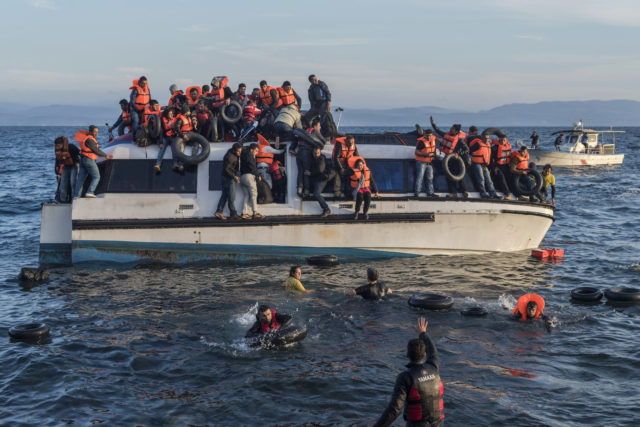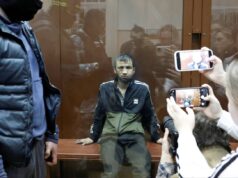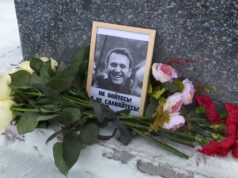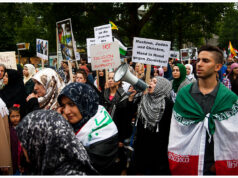
German Chancellor Angela Merkel’s Willkomenskultur (“Welcome culture”) refugee policy of last year has screeched to a grinding halt. Delivering an early December speech at her Christian Democratic Union’s annual convention, at which she was reelected as the party’s leader and candidate in the next national election with nearly 90 percent of the votes, she declared: “A situation like the one in the last summer of 2015 cannot, should not and must not be repeated.”
Merkel, in a move to placate critics of radical Islam, called for a ban of full-veil coverings for women. Her motivation in trying to outlaw this form of Islamic dress came not out of security concerns, but rather as an effort to win back voters from the far-right, anti-immigration Alternative for Germany party. She did issue a caveat to the ban: “wherever legally possible.”
Merkel’s pro-Islam rhetoric (“Islam belongs to Germany”) has largely disappeared from her speeches as the 2017 federal election approaches.
According to a German public opinion poll published in December by the Friedrich Ebert Foundation, a Social Democratic Party-aligned think tank, 40 percent of respondents said the country is being undermined by Islam, and 32 percent agreed with the statement that it is necessary to combat the government’s “current policy.” The lax—and at times nonexistent—system of vetting refugees and migrants is a perfect recipe for societal disintegration in the Federal Republic.
The German author and Social Democratic politician Thilo Sarrazin warned in his best-selling 2010 book Germany Does Away with Itself that the country’s system of unrestricted immigration would propel the Federal Republic toward oblivion. He was widely attacked by German intelligentsia—and by politicians across the political spectrum—for stoking societal discontent. His warning now seems to have been prophetic.
The chancellor’s policy of unfettered immigration ignored the threat of “weaponized refugees” from Muslim-majority countries. Take the two most salient examples from 2016:
In July, an Afghani refugee used an ax to wound four passengers on a train in the Bavarian city of Würzburg. A police officer shot the ax-wielding jihadi who yelled “Allahu Akbar” as he slashed his victims. The Islamic State claimed the Afghani as one its soldiers.
A little over a week later, a 27-year-old Syrian refugee detonated a bomb, blowing himself up and injuring 15 people at a concert in the Bavarian city of Ansbach. He had pledged loyalty to the Islamic State in a video found on his mobile telephone.
In late November, Merkel announced that her government would begin to repatriate migrants who have no legal basis to be in Germany. “It cannot be that all young people from Afghanistan come here,” said the chancellor. German news media reported that an estimated 100,000 asylum seekers will be sent back to their home countries.
Merkel’s open-door immigration policy is again in the cross-hairs of potent criticism. The police in the southeastern city of Freiburg arrested an Afghani man, Hussein K., for the rape and murder of 19-year-old Maria Ladenburger, who volunteered at a refugee center. Hussein K. drowned Ladenburger, the daughter of a senior EU official. It is unclear if Hussein K. was animated by radical Islam. Germany’s widely watched publicly-funded national news show Tagesschau did not report the murder of Ladenburger because it was a regional news item.
Mainstream German politicians – the governing coalition of Christian Democrats and Social Democrats – have showed little appetite to confront the jihadism embedded in the waves of refugees.
There are historical sensitivities at work in Germany. Writing on the website of The American Interest, the foreign policy expert Walter Russell Mead noted: “The refugee lobby makes things worse when it attacks the ‘racism,’ ‘Islamophobia’ and ‘xenophobia’ of ‘selfish’ publics unwilling to open the doors to refugees…”
Germany’s slavish devotion to multiculturalism furnishes the philosophical underpinning for a bottomless pit of relativity that allowed the immigration crisis to come about. A country that played such a large role in developing the modern philosophy of dialectical thinking (think of George Wilhelm Friedrich Hegel)—making necessary connections is front-and-center in this school of thought—has a blind spot when it comes to the interplay between unvetted immigration and terrorism.
Merkel’s 11-year tenure has been marked by a “Social Democratization” of her conservative party. She has longsince accomplished the equivalent of U.S. President Ronald Reagan’s ability to win over Democratic voters. Merkel’s “Reagan Democrats” are mainstream Social Democrats. With Merkel’s Christian Democratic Union and the Social Democratic Party governing together in a “grand coalition,” the largest opposition party in the Bundestag is the Left Party, a mix of disaffected western German trade unionists, and leftists and communists from the former East Germany.
A hyper-politically and socially correct environment does not lend itself to a sophisticated post-9/11 immigration policy.
The German Federal Office for the Protection of the Constitution (BfV)—the rough equivalent of the FBI—monitors Islamism and is responsible for detecting plots.
The failed German anti-terror system was perhaps best typified by the revelation that a German intelligence agent, who converted to Islam, was recently arrested for seeking to inspire Islamists to carry out an attack against the BfV.
The lack of rigorous pre-employment checks at the BfV is emblematic of Germany’s inadequate immigration control process. Authorities still rely on a 1994 law to evaluate candidates for the BfV. Internet searches to check for criminal activity and terrorist ideology are not a standard part of the agency’s hiring process.
Security officials issued alarm bells about the dangers of unvetted migration from Muslim countries as early as October 2015. “The integration of hundreds of thousands of illegal migrants in Germany is no longer possible in light of the numbers and already existing parallel societies,” noted a security establishment white paper.
The document stated: “German security agencies… will not be in the position to deal with these imported security problems and the resulting reactions arising from Germany’s population.”
A senior level security official said, “The great influx of people from all parts of the world will lead to instability in our country,” adding, “We are producing extremists through immigration. Mainstream civil society is radicalizing, because the majority don’t want migration and they are being forced [to accept it] by the political elite.”
He issued a grave warning: Many Germans “will turn away from the constitutional state.”
Similarly, Josef Schuster, the head of Germany’s Central Council of Jews, said, “Many Syrians and Arab migrants grow up in an environment in which hostility to Jews and Israel is common practice.”
Schuster, whose organization represents the country’s 100,000 Jews, continued, “When one lives in a country in which one is told for 30 years that Israel is the No. 1 arch-enemy and Jews from the outset are all bad, then one does not simply arrive in Germany and that is suddenly forgotten.”
Lethal antisemitism is a crucial component of jihadism and reactionary politics in the Arab world. The European-based, Islamic-animated terrorism that has resulted in the murder of Jews in Denmark, France and Belgium has—one can argue—only just begun.
When Schuster raised his concerns with Merkel in early October, she merely said, “We must take care of that.” She provided no specifics. Merkel’s comment to Schuster mirrors the ad-hoc component to Germany’s security apparatus.
Germany’s central European location – and its feeble counter-terrorism measures – make it a natural conduit for terrorists concealed as migrants.
The same smuggling operation that brought a terrorist to France who executed the Paris terror attacks was involved in aiding a terror sleeper cell in Germany. In September, the German authorities arrested three Syrian members who disguised themselves as refugees and were waiting for instructions to be activated.
A month later, U.S. intelligence provided a tip to the German authorities that the Syrian Jaber al-Bakr intended to bomb an airport in Berlin. To their credit, three Syrian refugees were able to detain al-Bakr before he executed his bomb plot. There have been additional cases of the German authorities impeding planned terrorists acts by migrants.
But Europe is in a mode of political and operational inertia. Comprehensive anti-terrorism strategies are non-existent. France remains in state of extended emergency.
What could influence a significant change in Europe’s counter-terrorism behavior? Sadly, sustained terrorism attacks along the lines of the November, 2015 Paris massacres in which jihadists murdered 130 people.
Mass terror attacks hammering away at civilians on a monthly basis in large Europe cities would produce profound security changes. In the absence of such wide-scale attacks, European countries will continue to limp on both legs in the war on terrorism.
The rhetoric of French leaders stands in stark contrast to other continental European politicians. The socialist French President Francois Hollande said in 2016: “The fact there is a problem [in France] with Islam is true. Nobody doubts that.” He added “there are too many arrivals, of immigration that shouldn’t be there.”
Hollande declared that he will not seek re-election in 2017. The socialist hawk Manuel Valls announced his candidacy along with competitors from the extreme-right Front National and the mainstream conservative party.
France’s presidential election might be the bellwether moment in 2017. A general election is also slated for the Netherlands in the same year. Members of the Netherlands parliament voted dramatically in favor of outlawing Islamic face veils donned by women in public situations. The November vote was passed by 132 members of parliament from a total of 150.
All of this helps to explain that there are shifts unfolding in Europe. In a year where unpredictability seems to be the only constant, it is difficult to gauge if tough leadership will emerge to crackdown on Islamic-animated terrorism among migrants.
The post-9/11 period in Europe has witnessed politicians (think of Nicolas Sarkozy’s presidency in France 2007-2012) who claimed to crack the whip like a German school teacher on immigration-linked terrorism but instead practiced the reformist deed.
France’s greatest president, Charles de Gaulle, neatly captured the phenomenon: “The graveyards are full of indispensable men.”
To combat lethal migrant terrorism, Europe and NATO will need to internalize that Bashar al-Asad’s war against his civilian population is the root cause. Europe will need to take the war to Syria. Kinan Masalmeh, a 13-year-old Syrian refugee, provided the solution for Europe in 2015 while in Hungary: “Please help the Syrians…The Syrians need help now. Just stop the war. We don’t want to stay in Europe. Just stop the war.”
Asad has nimbly exploited a war of displacement and refugee crisis to stop the 2011 democratic upheaval against his regime. The winners are Syria’s strategic partners—the Islamic Republic of Iran, Hezbollah, and Russia. The losers are Syrians.
Europe’s misguided migrant and refugee policy has advanced Asad’s war aims. Sadly.
Benjamin Weinthal, Ph.D. is a fellow at the Foundation for Defense of Democracies and a European affairs correspondent for the Jerusalem Post.





